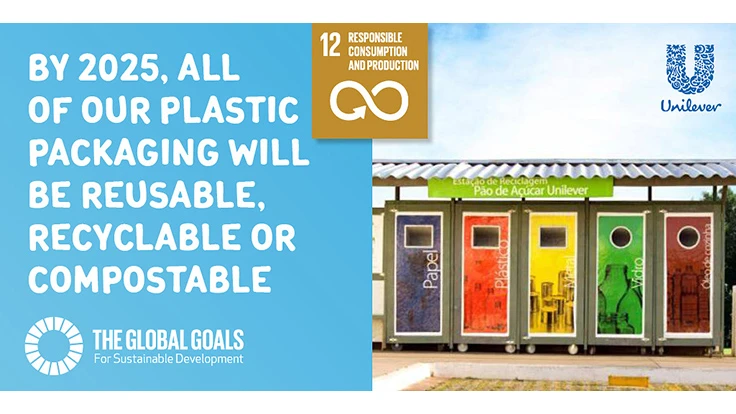
Netherlands-based consumer products firm Unilever says it has “committed to ensuring that all of its plastic packaging is fully reusable, recyclable or compostable by 2025” and in a news release carrying the announcement has called on “the entire fast-moving consumer goods industry to accelerate progress towards the circular economy.”
Treating plastic packaging as a valuable resource to be managed efficiently and effectively is a key priority in achieving Sustainable Development Goal 12 (Sustainable Consumption & Production) in its Unilever Sustainability Living Plan (USLP), the company says. It says doing so involves “shifting away from a ‘take-make-dispose’ model of consumption to one that is fully circular.”
To help transform global plastic packaging material flows, Unilever says it has committed to:
- ensuring all its plastic packaging is designed to be reusable, recyclable or compostable by 2025;
- renewing its membership to the London-based Ellen MacArthur Foundation (EMF) for another three years and endorsing and supporting its New Plastics Economy initiative by publishing the full “palette” of plastics materials used in its packaging by 2020 to help create a plastics protocol for the industry; and
- investing in, proving and then sharing with the industry a technical solution to recycle multilayered packaging pouches, particularly for coastal areas deemed most at risk of plastics leaking into the ocean.
Unilever says it has already committed to reduce the weight of the packaging it uses this decade by one-third by 2020 and increase its use of recycled-content plastic in its packaging to at least 25% by 2025 (against a 2015 baseline), both as part of the USLP. In 2015, Unilever reported that it met its commitment of sending zero nonhazardous waste to landfill across its manufacturing operations.
“Our plastic packaging plays a critical role in making our products appealing, safe and enjoyable for our consumers,” says Paul Polman, Unilever CEO. “Yet it is clear that if we want to continue to reap the benefits of this versatile material, we need to do much more as an industry to help ensure it is managed responsibly and efficiently [after] consumer use.”
Polman continues, “To address the challenge of ocean plastic waste, we need to work on systemic solutions - ones that stop plastics entering our waterways in the first place. We hope these commitments will encourage others in the industry to make collective progress towards ensuring that all of our plastic packaging is fully recyclable and recycled. We also need to work in partnership with governments and other stakeholders to support the development and scaling up of collection and reprocessing infrastructure that is so critical in the transition towards a circular economy. Ultimately, we want all of the industry’s plastic packaging to be fully circular.”
The EMF says 14% of the plastic packaging used globally makes its way to recycling plants, while 40% ends up in landfills and as much as one-third becomes litter. By 2050, it is estimated there will be more plastic than fish in the world’s oceans. Architect and circular economy leader William McDonough says the cradle-to-cradle redesign of packaging is one of the great global design challenges of our time - similar to scaling renewable energy to address climate change, according to Unilever.
“By committing to ambitious circular economy goals for plastic packaging, Unilever is contributing to tangible system change and sends a strong signal to the entire fast-moving consumer goods industry,” says Ellen MacArthur. “Combining upstream measures on design and materials with postuse strategies demonstrates the system-wide approach that is required to turn the New Plastics Economy into reality.”
McDonough says, “The optimisation of packaging and plastics is so timely and important that all the people, communities and companies involved – suppliers, producers, retailers, customers and consumers – can work together now, with common values and purpose, to create and share beneficial value for generations to come.”
Unilever says that as part of its commitment, it will ensure that by 2025 it is technically possible for its plastic packaging to be reused or recycled and that there are established, proven examples of it being commercially viable for plastics reprocessors to recycle the material.
Latest from Recycling Today
- BMW Group, Encory launch 'direct recycling’ of batteries
- Loom Carbon, RTI International partner to scale textile recycling technology
- Goodwill Industries of West Michigan, American Glass Mosaics partner to divert glass from landfill
- CARI forms federal advocacy partnership
- Monthly packaging papers shipments down in November
- STEEL Act aims to enhance trade enforcement to prevent dumping of steel in the US
- San Francisco schools introduce compostable lunch trays
- Aduro graduates from Shell GameChanger program





